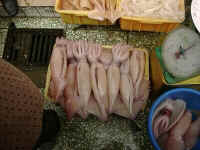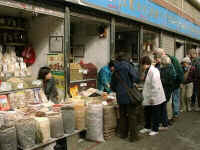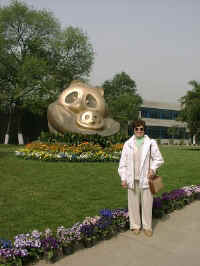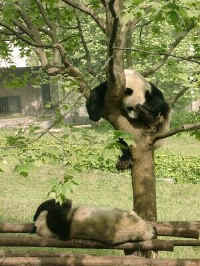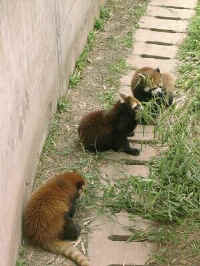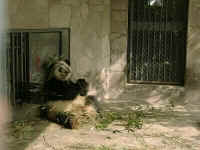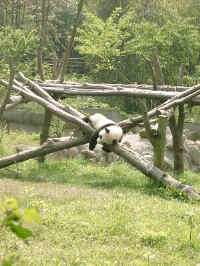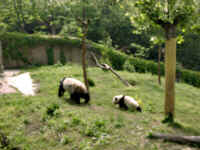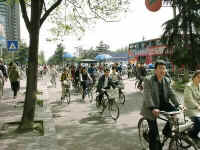|
XIAN Friday, 14 April. After putting our suitcases out at 7:30 a.m., we had breakfast. At 8:30 the bus took us to the public market where locals shop for the day's food. Surprisingly, since Xian is so far from the ocean, there was more seafood (mostly live) than anything else. It's flown in daily. There were lots of traditional things, like herbs and spices, also a great variety of fowl. But there also where many strange things Westerners just don't think of as food, such delicacies as silk worms. We thought we had discovered the ultimate when we saw donkey veins for sale. That was before we found the donkey's fallopian tubes. CHENGDU The bus got us to the airport in plenty of time for our 12:50 p.m. flight to Chengdu, capital of Sichuan Province. We had box lunches before boarding, then a snack on the plane. It was a pleasant flight and right on time. They even gave every passenger a handsomely-boxed scarf (made in Korea). We arrived in Chengdu at 2:10, but by the time we got to the Jinjiang Hotel it was nearly 4:00. Our local guide was Harry (Li Ping). He was crude and obnoxious, as well as difficult to understand. We ate dinner at the hotel at 6:30 and took the evening to relax. Saturday, 15 April. After the buffet breakfast, we met at 9:30 for the bus ride to the Giant Panda Breeding and Research Center outside the city. The facility is more like a zoo than we had expected, though there are large open areas for the pandas to roam. They have eight giant pandas there, six adults and a pair of twins seven months old. We saw them all. We also saw several of the lesser pandas, a smaller, mostly brown animal closer in appearance to its cousin, the raccoon. (The giant panda is also a member of the raccoon family.) The bus took us back into Chengdu where we had lunch, then returned to the hotel. Most of the group joined Li on a walking tour of a nearby market that featured pets as well as food and other merchandise. (Jane rested at the hotel.) There were plenty of puppies, kittens and birds. It's very rare to see a dog or cat on the street in China. (We saw one dog in nearly three weeks.) Li explained that the permit to have a dog or cat is very expensive. As a result, birds are the most popular pet. (We also never saw a bird flying free in China.) We were back at the hotel before 4:00. At 6:30 we all met for a "western dinner" on the top floor of the restaurant. We were all getting tired (fed up?) of taking our food from a lazy-susan and trying to eat it off of 4-inch plates, so this was a welcome change. There was a nice view of the city, first by daylight, then by night as it got dark. The dinner came with a big lettuce salad, something we had been cautioned not to eat in China, but most of us ate it with no harmful effects. Afterwards we had to repack our suitcases completely so we could leave the two big ones behind and take only our carry-ons to Tibet. The suitcases had to be out in the hall by 9:00 p.m.
Copyright © 2000-2023 DarrellPeck.com All rights
reserved. |


